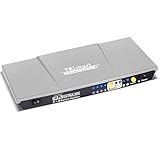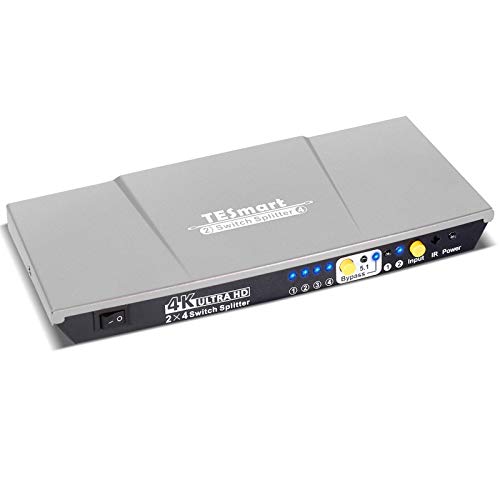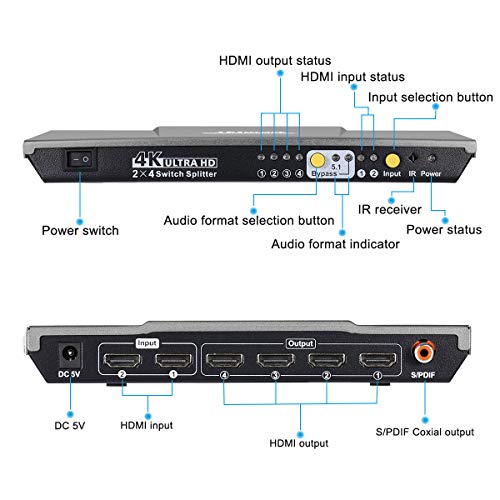With so many streaming services in our lives, we sometimes find ourselves with more TV sets and screens than our streamers can handle. But even if you have more than one screen at home, you don’t necessarily need another streaming device – instead, you can use an HDMI splitter.
An HDMI Splitter lets you “split” the signal from one media box (a streaming device, a gaming console, a Freeview box, etc.) to two or more screens – be it another TV, a projector, etc.
But even though it’s a simple device to operate, finding the best HDMI splitter in the UK can be tricky (especially with devices often going out of stock) – so in this review roundup, I take a look at the top ones, and explain what to look out for before you buy.
Best HDMI Splitters 2023
Excellent 4K HDMI splitter at a great price point and thousands of happy buyers.
Another excellent 4K splitter with gold-plated connectors.
Two HDMI input ports and four outputs for maximum flexibility (but it’s pricey)
4K 60Hz Splitter – excellent for higher frame rate 4K devices like the PS4 Pro.
Solid HDMI splitter at a very affordable price.
Table of Contents
What Is An HDMI Splitter?
Many of us have more than one TV screen in our house these days. It could be one TV in the living room and another one in the bedroom, or maybe you have a small one in the kitchen, or a 4K projector somewhere along with a regular TV… you get the point.
However, with multiple screens comes the problem of using your media devices – such as streaming devices, gaming consoles, DVD players, etc. – with those multiple tellies. Without buying multiple devices, that is…
That’s where an HDMI splitter comes in – it’s a small box that lets you plug in one “Input” device – that’s your streamer/DVD Player/etc.’ – and connect TWO (or more) screens to the “Output” side, all via HDMI cables.
The splitter then “duplicates” the signal coming from your media device – and sends it to your two outputs. So you can watch the same stream on two TVs, a TV and a projector, and every other example you can think of.
This is also important when you have a subscription to a streaming service that limits the number of simultaneous streams you can watch. For example, if you have the Standard Netflix membership, you can only watch up to two streams at once.
But when you split the signal to two televisions in two different rooms – you’re still using just one Netflix “stream”. (Just remember that the streams will be identical, so both TVs will show the same content coming from the same media device).
What’s The Difference Between An HDMI Splitter And HDMI Switcher?
When you start searching for the best HDMI splitters, you’ll also see a different type of device, called “HDMI Switcher” (in fact, some places use the term interchangeably – which is quite wrong).
But be warned, these are devices that serve opposite functions.
An HDMI Splitter is used to connect ONE DEVICE to two or more TVs (or other screens/projectors), by duplicating the stream.
An HDMI Switcher is used to connect TWO DEVICES (or more) to one TV, and you switch between them with a button.
So a switcher lets you switch between different HDMI signals, while a splitter lets you split one HDMI signal out to several screens. (If you need one – see our list of the best HDMI switchers.)
There are a few exceptions – for example, products that can function as both a Splitter AND a Switcher (so all their ports can serve as either Input or Output), and products that let you Switch different devices and then Split them to multiple screens.
But generally speaking, when looking for an HDMI Splitter, it’s best to look for a product with One Input port and Two (or more) Output Ports – which is usually designated as “1×2”.
Buying The Best HDMI Splitter: Things To Consider
Getting the top HDMI splitter for your needs is not just a question of build quality – it’s also a question of what your needs are, exactly. How many screens do you have? Do you need 4K? Are you a console gamer?
Here are some of the thing you should consider before you buy the splitter:
The Distance Between The Devices
Like most other media and data cables, the video signal on HDMI cables degrades over long distances.
So if you’re planning to split one source into two screens – one in your living room and one in your bedroom – you should first consider how far that bedroom is.
There are no exact numbers here – but roughly speaking, 15 meters are considered the limit as far as good HDMI signals go.
However, even that will probably be too far for the top picture quality – especially if you’re planning to stream 4K video.
So while the only way to know for sure is to test your device, the splitter and your cables – I would generally suggest, if your other screen is more than 6-7 meters away, to get a higher-quality HDMI splitter and higher-quality HDMI cables, as that would help minimise the signal degradation.
How Many Ports Do You Need?
Most HDMI splitters are 1×2, meaning one input port and two output ports. If you have more than two screens that you want to duplicate the signal to, you’ll obviously need more than two output ports.
Some HDMI splitters also have a built-in HDMI Switcher, so if you plan to send the signal from two media devices (a streamer and a DVD player, for example) to two screens, you should look for a combined product that has at least two input ports, in addition to the two output ports (The TESmart 4K Switcher/Splitter fits that bill).
HDMI Splitters With 4K/HDR Support
4K is quite popular these days, so tellies and streaming devices with 4K support are the norm.
So if you want to connect a 4K device (such as the Amazon Fire TV Stick 4K, or a Blu-ray 4K player), to two 4K televisions, you need an HDMI splitter that specifically supports 4K. Otherwise, you’ll only get Full HD – 1080p. (All the splitters recommended in this article are 4K-compatible).
You should also note the HDMI version on the splitter. All splitters support HDMI 1.4, but if you want 4K, you need the splitter to support HDMI 2.0, or preferably HDMI 2.1.
HDMI Splitting And HDCP Support
High-bandwidth Digital Content Protection (or HDCP) is a copyright protection mechanism that’s built into all modern HDMI-based video devices.
The technology encrypts the signal that comes out of your media device, with your telly decrypting it on the other side.
HDCP’s aim is to protect video feeds from illegal copying, and you need to make sure the HDMI splitter you’re buying supports this standard, otherwise most devices you connect to it won’t be able to broadcast anything to your screens.
Most reputable HDMI splitters already support the HDCP standard – but it’s something to double-check.
However, most devices only support HDCP 1.4 – which is fine for most uses, but some 4K boxes (like the Sky Q for example), require HDCP 2.2, so be careful with that.
How Is The HDMI Splitter Powered?
Unlike HDMI Switchers, which are often powered by the HDMI devices connected to them, most HDMI Splitters need an external power source.
That’s because their input side is only connected to one HDMI device, which doesn’t give them enough extra power to function properly.
Some HDMI Splitters are powered by a regular power cable that goes into a wall outlet, and some are powered by a USB cable which gives you more flexibility.
HDMI Splitters Refresh Rate And Gaming Console Use
Most 4K HDMI Splitters support 30Hz, which is enough for most regular video uses – it means you’ll see up to 30 frames per second.
For console gaming, however – especially if you’re planning to use something like the PS4 Pro, you might be better off with a 60Hz splitter, which supports 60 frames per second (or even 120Hz for the PS5 – but 4K at 120Hz splitters are harder to find – and they’re considerably more expensive, for now).
Remember, as always, that the splitter simply duplicates the input signal, so both screens will show the same gaming console output – but it’s useful if you want people in the other room to watch you play, for example.
Cord Busters Best HDMI Splitters 2023
| Rank | HDMI Splitter | Our Rating | Price |
|---|---|---|---|
| 1 | Belfen 4K HDMI Splitter | ⭐⭐⭐⭐⭐ | CHECK PRICES |
| 2 | TOPYIYI 4K HDMI Splitter | ⭐⭐⭐⭐⭐ | CHECK PRICES |
| 3 | TESmart Splitter & Switcher 2×4 | ⭐⭐⭐⭐ | CHECK PRICES |
| 4 | TESmart HDMI Splitter 4K@60Hz | ⭐⭐⭐⭐ | CHECK PRICES |
| 5 | AmazonBasics 4K HDMI Splitter | ⭐⭐⭐⭐ | CHECK PRICES |
Best Overall
Pros
- Supports 4K
- Thousands of positive reviews
- Powered by USB cable
- Great price
Cons
- No HDR Support
- Not a good fit for 4K Gaming
- Doesn't support HDCP 2.2.
Belfen 4K HDMI Splitter Review
A reliable HDMI Splitter at an excellent price, which comes with an HDMI cable in the box.
It supports 4K at 30Hz, which is good for most uses, except for 4K gaming – so it’s not a good fit for the PS4 Pro or PS5.
As with most “unknown” brands, build quality is occasionally an issue, but most buyers on Amazon were satisfied – so that’s usually a good sign.
Best Overall
Pros
- Supports 4K
- Powered by USB cable
- Great price
Cons
- No HDR Support
- Not a good fit for 4K Gaming
- Doesn't support HDCP 2.2.
TOPYIYI 4K HDMI Splitter Review
Another solid HDMI Splitter at an affordable price, this one comes with a built-in HDMI cable.
It supports 4K at 30Hz, which is good for most uses, except for 4K gaming – so it’s not a good fit for the PS4 Pro, PS5, and other 4K gaming consoles.
All in all, if you need a solid splitter that does exactly what it sets out to do, this is another great match.
Pros
- 2 Input Ports (for switching) and 4 Output Ports (for splitting)
- Supports 4K
- S/PDIF Coaxial Audio Port
- Remote Control (for the switcher)
Cons
- No HDR Support
- Not a good fit for a PS4 Pro
- Doesn't support HDCP 2.2.
- Not cheap
TESmart 4K HDMI Switcher & Splitter Review
If your home entertainment setup is a bit more complicated than just one media device and two screens – the TESmart Splitter/Switcher will give you more options.
First, it’s a switcher with two input ports, so you can connect two media devices (streamer, DVD player, etc’) and switch between them (with a button, or with the supplied remote control).
Then, it’s also a splitter, with four HDMI outputs – so you can duplicate the media device you’re switching to out to four separate screens.
And to top it all, it has an S/PDIF port, if you want to connect it to a digital audio device (and bypass the HDMI audio).
It’s a bit more expensive than the simple splitters, but you get what you pay for, with more flexibility from a reputable manufacturer.
Pros
- Supports 4K, HDR and Dolby Atmos
- 60Hz - Great for gaming consoles
- Supports HDCP 2.2
Cons
- 60Hz HDMI Output Cable needs to be less than 5 meters
- Not cheap
TESmart HDMI Splitter 4K@60Hz Review
Most readers can settle for 4K@30Hz – but if you’re planning to split a 4K gaming console like the PS4 Pro, or if you want to split a 4K HDR device at the best quality (like a Blu-ray player), you would do better with a 60Hz Splitter, which lets you play 60 frames per second.
That’s exactly what this TESmart splitter does – with added support for the most recent HDCP standard (2.2 – so it should be suitable for Sky Q), as well as Dolby Atmos and several other advanced audio formats (though the splitter is just a pass-through – you still need a device that can interpret these audio signals).
It won’t give you 4K at 120Hz, which can be beneficial for next-generation consoles like the PS5, though.
Plus, it’s a bit more expensive than some of the other splitters – but you get more for your money in this case.
Pros
- Supports 4K
- Heavy duty metal shell
- Powered by USB cable
- Excellent price
Cons
- No HDR Support
- Not a good fit for PS4 Pro
- Doesn't support HDCP 2.2
TESmart HDMI Splitter 4K@60Hz Review
AmazonBasics is Amazon’s private label, which usually means cheap but solid products – and this splitter is exactly that.
Without any bells and whistles, this splitter does what it sets out to do, and at 4K.
It doesn’t support HDR or HDCP 2.2, and it’s 30Hz, but if you’re not looking for anything too fancy, this splitter is usually the best priced of the bunch.









Any HDR 4K 120hz hdmi2.1 2160p 1 in 2 out SPLITTERS around then???
Emphasis on 120hz. Might be design as 8K @ 60hz, but also handle 4K at 120hz.